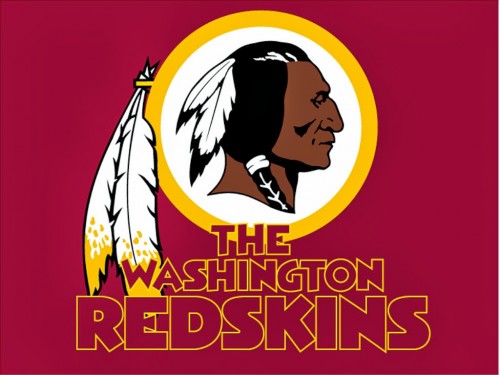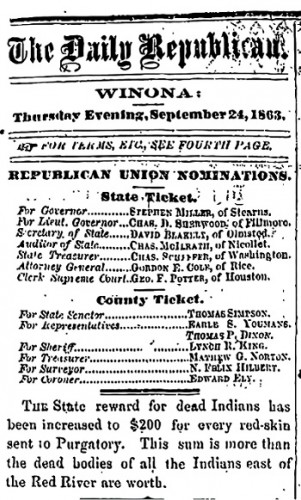What’s in a name? The shameful case of the “Washington Redskins”
 How is the “Washington Redskins” team name still in use in this day and age?
How is the “Washington Redskins” team name still in use in this day and age?
Most of us have heard the term, “Sticks and stones may break my bones but words will never hurt me?”
Did you ever believe it was true?
Not likely, because we all know words have power and can hurt.
In fact, there is ample evidence that negative thoughts, feelings and words, can be harmful to the body.
It follows that everyone, be it an individual or a national sports team, should be more conscious of their use of words.
THE HISTORY OF THE TERM “REDSKINS”
The Washington team has tried to defend its name choice by saying that the term “Redskins” honors Native Americans. But that view doesn’t hold up under scrutiny.
The origin of the term “redskin” is unclear, and may have originally been used by Native Americans themselves to be distinguished from their white-skinned visitors.
Yet, clearly over time “redskin” has taken on a negative meaning.
A newspaper in Winona, Minnesota used the word as part of a bounty notice published in its evening edition on September 24, 1863. The notice read:
“THE State reward for dead Indians has been increased to $200 for every red-skin sent to Purgatory. This sum is more than the dead bodies of all the Indians east of the Red River are worth.”
[Source: http://thinkprogress.org/sports/2014/01/30/3205071/redskins/]I think we need look no further than that statement to determine that “redskin” is a disparaging term. It meant “proof of Indian kill.”
In fact, Dictionary.com defines redskin as “a contemptuous term used to refer to a North American Indian.”
 THE ENERGY OF WORDS
THE ENERGY OF WORDS
Dr. Masaru Emoto’s water crystal work is a powerful demonstration of the power of words. He was a Japanese researcher who developed a technique using a very powerful microscope and high-speed photography to photograph newly formed crystals of frozen water samples.
He discovered that crystals formed in frozen water change when specific, concentrated thoughts or words are directed toward them. Water exposed to loving words show brilliant snowflake patterns. Water exposed to negative words formed incomplete, asymmetrical patterns with dull colors.
Since the average adult body is comprised of 70% water, it’s easy to conclude that the effect of negative versus positive words on our health can be significant.
“Research shows that exposure to negative words can cause a release of stress-producing hormones and neurotransmitters. These chemicals immediately disrupt the normal functioning of the brain, impairing logic, reason, language processing and communication.
“In fact, just seeing a list of negative words for a few seconds will make a highly anxious or depressed person feel worse, and the more you ruminate on them, the more you can actually damage key structures that regulate your memory, feelings, and emotions.” [Source: Words can change your brain; the neuroscience of communication by Andres Newberg, M.D. and Mark Robert Waldman, Psychology Today, 7/31/12]
So it stands to reason that the term “redskins” is a negative word that can contribute to such results just by being out there in the public consciousness.
WHO STANDS WHERE IN THIS CONTROVERSY
Team owner Dan Snyder has said, “We’ll never change the name of the team. It’s that simple. NEVER – you can use caps.”
The Pew Research Center found that at least 76 news outlets and journalists have publicly stated their opposition to the Washington Redskins’ name, or moved to restrict or ban its use.
Veteran NBC sportscaster Bob Costas calls the name, “an insult.”
Several college teams that formerly used the name “redskins” have changed voluntarily, including:
The University of Utah Redskins became Utah Utes in 1972.
The Miami University (of Ohio) Redskins became the RedHawks in 1997.
The Southern Nazarene University Redskins became the Crimson Storm in 1998.
Television personality David Letterman said, “I’m with the American Indians. If they find this offensive, by God, so do I. Haven’t they suffered enough? If this in any small measure makes anyone feel better about who they are, change the name.”
President Obama: “If I were the owner of the team and I knew that there was a name of my team — even if it had a storied history — that was offending a sizeable group of people, I’d think about changing it.”
The United States Congress introduced a 2014 House bill that would strip the National Football League [NFL] of its tax-exempt status if Washington’s franchise continues to operate with “Redskins” as its team name.
In 2014, Fifty U.S. senators wrote NFL Commissioner Roger Goodell to officially call on the Washington franchise to change its team name from the “Redskins” – a request that was quickly shot down by the league.
Virtually every major civil rights organization in America has spoken out in opposition to the team name including:
The National Association for the Advancement of Colored Persons [NAACP],
The American Civil Liberties Union [ACLU],
The Anti-Defamation League,
The Rainbow Coalition and
The League of United Latin American Citizens.
Just this past Monday, January 19, 2015, a civil rights group that has worked with the NFL on diversity issues in the past filed a complaint to the league over the continued use of the name “Redskins” by the team.
The nonprofit Fritz Pollard Alliance [FPA], whose mission statement is to promote diversity and equality of job opportunity in the NFL, said it issued the complaint after carefully studying the issue and meeting with both sides.
The Huffington Post in a January 20, 2015 article quoted the Alliance as saying, “Over the last year, FPA has had multiple conversations with leaders of the Washington Football Club, including owner Dan Snyder and Club President Bruce Allen, as well as leaders in the Native American community,” Fritz Pollard Alliance Chair John Wooten and Executive Director Harry Carson said in a joint statement obtained by NBC Sports. “Based on our study and conversations, we believe the Washington Club should cease using the name.”
Members of the American Anthropological Association, Netta Avineri, Ph.D. and Bernard Perley, Ph.D., said in an article in the Huffington Post that,
“Teams choose names, mascots, and logos that embody the vigor and grit that athletics provide and should reflect positive associations, identities, and role models, especially for young people. . . while some sports identities depict Native Americans with respect and sensitivity, many do not.
“We as anthropologists have documented the personal pain, ostracism, and societal hardship that racism creates for Native Americans. We call on Dan Snyder to retire the name — it is a racial slur that must be abandoned.
“How do slurs hurt? They create a climate that degrades a whole segment of the population, rather than fostering an inclusive, respectful environment.”
THE 2014 TRADEMARK RULING
On June 18, 2014, the Trademark Trial and Appeal Board (TTAB) of the United States Patent and Trademark Office (USPTO) cancelled the six trademarks held by the team in a two to one decision that held that the term “redskins” is disparaging to a “substantial composite of Native Americans”, and this is demonstrated “by the near complete drop-off in usage of ‘redskins’ as a reference to Native Americans beginning in the 1960s.”
The effect of the ruling is largely symbolic; the team can still use the name, but now has no protection against infringement and counterfeit merchandise. The team is fighting the decision in Federal Court.
AN EXCUSE THAT JUST DOESN’T STAND
Owner Snider has clung to the defense that the team name was changed from “Braves” to “Redskins” in 1933 to honor the team’s then-head coach, William “Lone Star” Dietz, who claimed to be Native American.
Historian Linda M. Waggoner’s research found that Dietz was not Native American at all, but falsely represented himself as one in order to avoid the draft in WWI. As a result, he spent 30 days in jail.
Newspaper articles from 1933 quote then owner of the team, George Marshall, as saying he changed the name from the Boston Braves to the Boston Redskins so the team wouldn’t be confused with the Boston Braves baseball team. “The fact that we have in our head coach, Lone Star Dietz, an Indian, together with several Indian players, has not, as may be suspected, inspired me to select the name Redskins.”
AND A CHILD SHALL LEAD THEM
In 2013, the school board in Cooperstown, New York voted to drop the “Redskins” name used by Cooperstown Central High School. The vote came at the request of students who no longer saw the name as appropriate.
There are virtually no Native Americans in Cooperstown. In fact, according to the Census Bureau, Otsego County, New York is nearly 95% white. Native Americans make up just 0.2 percent of the county’s population.
Native Americans hadn’t forced this change. A group of white students who didn’t want to exclude another group of Americans had.
Arthur Halbritter, Native American leader in the fight for a name change said, “They were kids and they did something these billionaire team owners and the nine-billion-dollar NFL won’t do. That was sort of a shining light moment, a moment of clarity. That was very inspiring to us.
“There’s no financial solution to a moral problem,” Halbritter said. “Just because you’re a billionaire doesn’t give you the right to use a racial slur.”
There are those who say that not all Native Americans are offended by the term “redskins.” My reply to that is: “been down so long it looks like up to me.”
Too much of our society has gone unconscious and doesn’t think about the repercussions of even the smallest act or word.
It’s time to wake up, be responsible and do the right thing.
Let’s hope as the pressure mounts, wiser heads will prevail and the use of this racial slur will stop.
Molly Larkin is the co-author of the international best-seller “The Wind Is My Mother; The Life and Teachings of a Native American Shaman” and other books on health. She is passionate about helping people live life to their fullest potential through her classes, healing practice and blog at www.MollyLarkin.com

